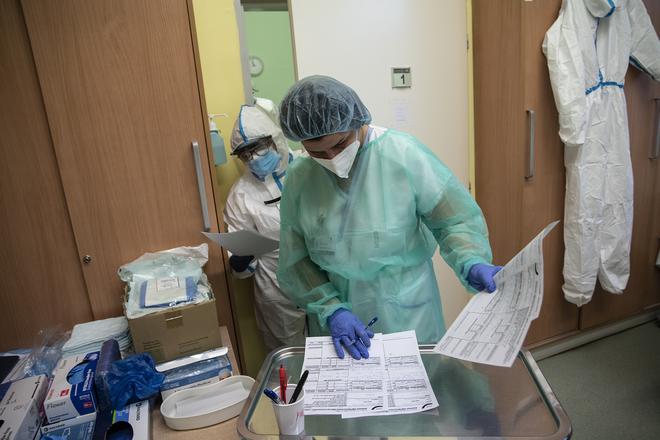"I believe it." Reporting from where antibody cocktails are putting out the covid fire<
Article
Not long ago, the inconspicuous workplace of the neurological clinic served ordinary patients. With the autumn increase in covid-positive patients, the course of things has changed here as well. However, unlike other wards, local beds are not filled with patients with failing lungs.
On the contrary, people come here in the hope that, due to their long-term health condition, they will not become the next victims of the coronavirus or that the infection will not send them to the care of intensivists. The workplace has become another place where healthcare professionals administer monoclonal antibodies to high-risk patients.
"You have to take care of yourself, those patients are infectious and some of them cough badly at times," warns nurse Pavlína, handing out individual parts of protective clothing. At first glance, the local staff form a well-coordinated team. And this despite the fact that the current job description is only very distantly similar to the usual one.
After putting on all the protective equipment, we arrive at a room with four beds - on each of them lies a patient with an intravenous infusion. The administration of the drug takes about half an hour, along with other matters, monitoring and measurements, the administration of monoclonal antibodies takes about two hours. Patients can lie on their beds in their clothes only with respirators on.
“A week ago I had a little cold and cough. So I went for a test and they told me I was positive," recounts the 73-year-old Mr. Miroslav. The doctor prescribed him the treatment as a high-risk patient. "I believe it. I believe it will help me. Just as I believe that vaccination is needed. I've had AstraZeneca twice, I was supposed to go for the third dose, but unfortunately I haven't had enough yet," he adds.
Even a senior married couple lying nearby did not have time to receive the third dose of vaccination. "We were supposed to go to the third dose today. Instead, we're here, it's such a paradox," says a woman whose doctor prescribed treatment for autoimmune liver disease and asthma after discovering the infection.

According to doctor Jan Krupička, who is in charge of coordinating the administration of monoclonal antibodies, seniors with associated diseases are suitable candidates for this treatment. "It is typically an elderly person who has multiple chronic diseases. Alternatively, a patient with a reduced immune system. They are often hemato-oncology patients or patients receiving immunosuppressive treatment," the doctor describes.
Salvation from severe covid. This is how "miracle cocktails" are served
6. 11. 2021 15:18Due to her chronic illness - multiple sclerosis - 35-year-old Barbora, who is lying on the bed opposite Mr. Miroslav, also came for antibodies. Unlike the other patients, she was not vaccinated. "I'm used to infusions, so it doesn't even occur to me. After I found out I was positive, the practitioner told me about the treatment and I called my specialist. She prescribed me the medicine so that the covid wouldn't do me even more damage," says the young woman.
After the application of antibodies, patients can return to home isolation and have a fairly good chance of not returning to the hospital due to covid. Studies show that drugs can reduce the risk of hospitalization and death by up to seventy percent.
“Sometimes we also have people here who feel relief right after the application. He leaves saying that his muscles don't hurt so much anymore and the like. Sometimes they call on the second or third day that they are better. Then we are very happy about that," says the nurse.
65 thousand for one application
Side effects, according to doctor Jan Krupička, occur only rarely. "It is about a temporary decrease in blood pressure, which can be managed relatively well with infusion treatment. Or rarely allergic and febrile reactions occur. But even those can usually be managed without the need for hospitalization," he says.
However, he points out that the treatment is not intended for everyone and makes the most sense precisely for precisely indicated risk patients. And not only because of the costs, which are around 65,000 for one application. According to him, people should definitely not hesitate to get vaccinated, for example, because they believe that monoclonal antibodies will help them in an emergency.
“I would simply compare it to putting out a fire. When we give monoclonal antibodies, it will always be putting out a fire that has started and lasts for some time. Of course, the longer the fire burns, the more damage it can do to you. When you are vaccinated, you can stop the infection in the beginning and not after a few days. This is where vaccination is definitely better and more effective," explains the doctor.
In addition, he adds that the administered monoclonal antibodies remain in the body for three weeks to a month and therefore only work on the current infection. Vaccination therefore has a "longer shelf life" in this regard.
Doctor Krupička admits that part of the patients are grateful for the innovative and expensive treatment and makes this clear to the health professionals. "However, most people take it for granted. Then there are even those who come and don't know what awaits them. It also happened to us that someone rejected it after coming here. Which is, of course, a complication, because it will take the place of someone else who would need the submission at that moment," he adds.
Nurses, according to their words, do not even dare to estimate how long people with a positive diagnosis will continue to come to the clinic for special treatment. However, they expect that the sled may last until spring. "Maybe until March. But we are already looking forward to everything being normal again," adds one of them.


 Tags:
Tags: Prev
Prev







